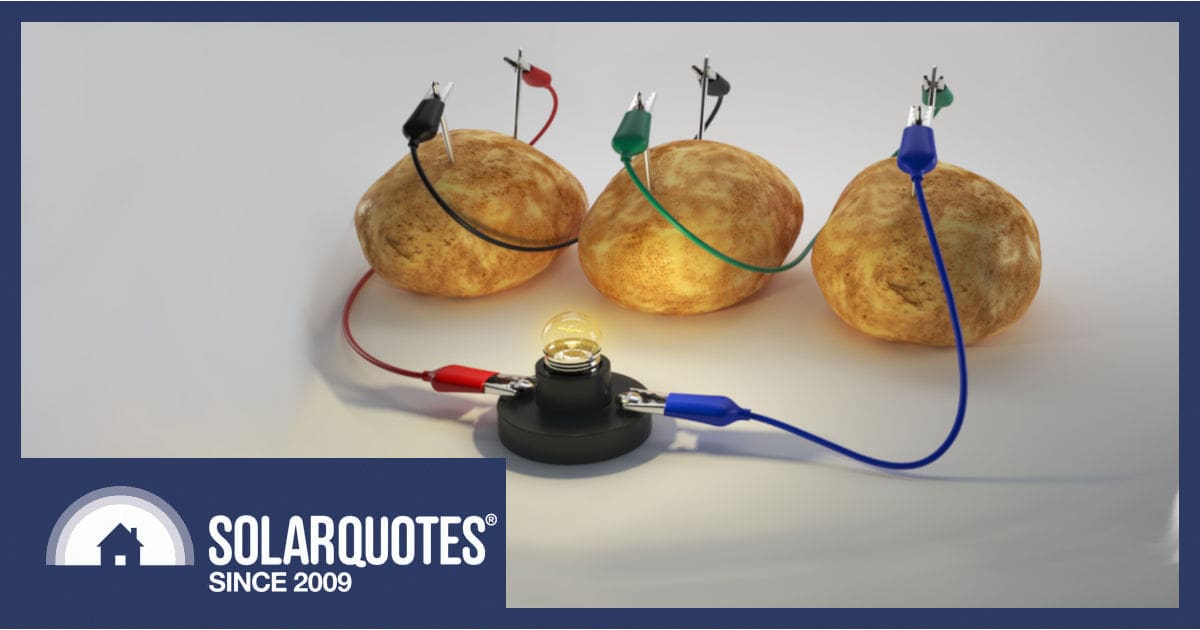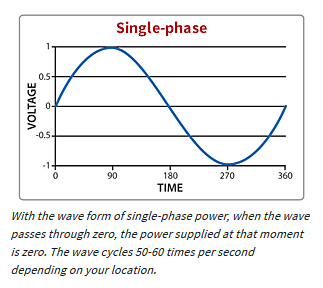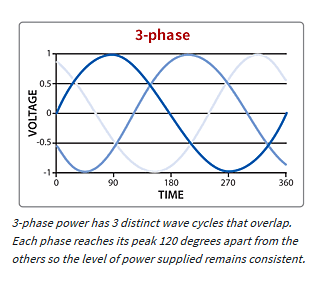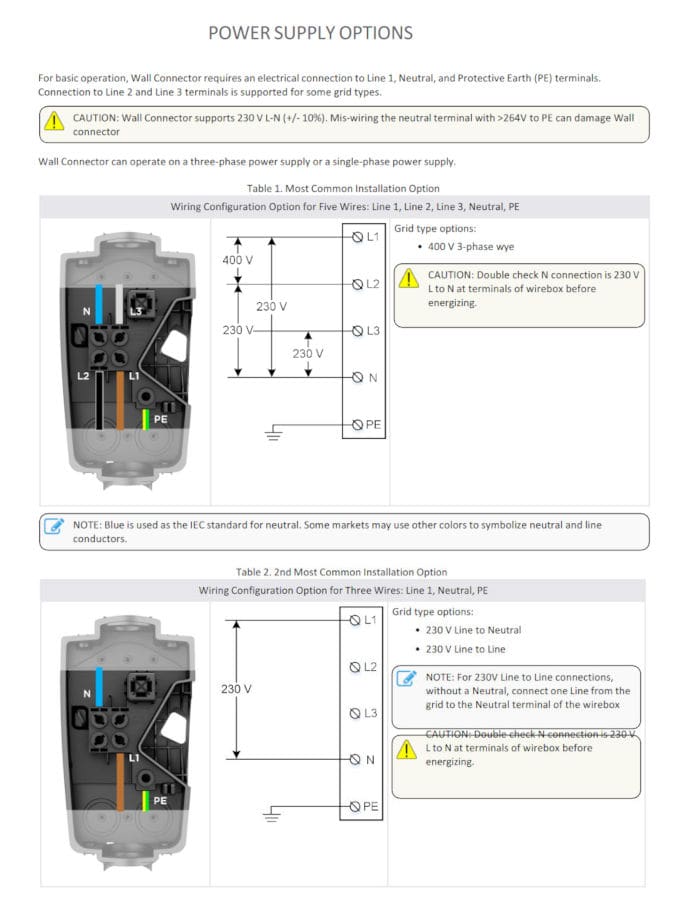
If only home batteries were this simple
Today’s post explains that no matter how hard you pedal, if you take two wheels off your tricycle, it won’t go anywhere.
In other words, a single-phase battery won’t power a three-phase appliance.
So whether you have a large ducted air conditioner, medium-sized bakery machinery or small industrial roller door, the most common battery backup systems simply can’t run a synchronous 3-phase load.
And, of course, there are always some exceptions I’ll detail later…
What The Hell Is Three Phase?
You may have heard people mention electricity in phases. They’re talking about whether you have 1, 2 or 3 active supplies coming from the street. While almost everything inside your house runs on single phase, there may be a few big-ticket items, like air conditioning or EV chargers, using all three supplies; they’re 3 phase appliances.
It’s one of the first things a savvy solar salesperson will ask you, and to help answer the question, we put together this handy guide in our even handier FAQ section.
We should rename it the CAQ for Commonly Answered Questions because these aren’t inane filler for a website. They are real queries from real people we wrote real answers for.
Single Phase Batteries Are Easy.
Market leaders like Fronius, Sungrow & GoodWe all offer very solid grid-connect solar battery systems.
Single-phase offerings cover the broadest variety of models and brands. In fact, top-quality brands like Enphase batteries and Tesla Powerwalls don’t offer three-phase units at all.
The primary advantage of a single-phase battery-backed system is good power surge capacity. Whatever the specified capacity, all of the firepower is aimed at one output, which is important when you’re trying to start a motor like a fridge compressor or rainwater pump.
To be honest, most people with a 3-phase home will be quite happy only backing up a single “essential” phase during an outage.

Single-phase has a single AC wave
Three Phase Batteries Are Less Common.
While they used to be quite rare, as we recently outlined a much broader range is now available.
Generally, people don’t want to back up three-phase appliances. They are, by nature, large energy users for which you’d need a massive and expensive battery capacity.
However, the arrangement of your buildings or switchboard location might dictate that you need a three-phase battery system because rewiring the whole house is not an option.
Most 3-phase battery systems have a limited surge rating because roughly one-third will be available to run any given single-phase circuit. For example, a 10kW nameplate will only deliver 4kW for 5 seconds to an unbalanced load.

3 phase means AC waves that overlap each other
A Single-Phase Battery Will Not Backup A 3-Phase Solar Inverter
If you have a 3-phase solar inverter and the single-phase Tesla Powerwall, an extended grid outage will still be problematic because the Powerwall, even if you buy three of them, cannot form a synchronous 3-phase supply to reboot the solar inverter. This is true of any single-phase battery that’s AC coupled to a 3-phase solar system.
When the grid goes down, you have whatever energy is stored in the battery, and it won’t be replenished until mains power is restored.
However, if your solar power is provided from a single-phase inverter, Powerwall will happily keep the power on to that solar inverter, provided the equipment is sized under 5kW or controlled correctly by the commissioning electrician.
A Single-Phase Battery Can Backup All The Single-Phase Loads On A Three Phase House
If you have a 3-phase house but you’re happy to lose the use of your 3-phase loads in an outage, a clever electrician can set up a contactor arrangement that can parallel all your wiring to be backed up by a single-phase battery system.
Imagine taking the back wheels off your trike and putting them beside the front one, even though you’ll need to balance things carefully, it’s possible to ride it like a unicycle.
The same approach can be used for a 3-phase EV charger. It would be possible to top up your EV when it’s sunny, although I would suggest a manual changeover arrangement for this, as it would be too easy to just drain the house battery into the car.
But it’s easier to just put all your essential loads on one phase and simply back up that phase.

Tesla wall connector EV chargers will work on single or three phase.
Do You Really Need A 3-Phase Battery System?
Even though Australia’s grid is 99.998% reliable by law, many people are investigating batteries for both economic and security reasons.
If you have a 3-phase house, seriously consider whether you need a 3-phase battery. Can you put your essential loads on the same phase and happily ride through outages with only that phase backed up?
Your choice will depend on whether your solar inverter is single or three-phase, how critical your 3-phase appliances really are and how much money you’ve got to spend.

 RSS - Posts
RSS - Posts



We have 3-phase power, for the air con and a 20 amp power socket in my workshop. The air con is a 7.5kW unit. Our battery is just 10 kW Sungrow, and we used the backup just once.
The computers didn’t even notice the changeover. The only thing that lost power was the TV. We have gas instant heat hot water, so we don’t even lose that. The ceiling fan works well. Sungrow battery has earned its keep.
Why do you have 3ø for a 7.5kW A/C?
Pls correct me if I am wrong, but a single phase battery system, with a 3 phase AC coupled solar inverter will have an issue with charging a 3 phase EV when the grid goes down. The 3 phase inverter needs Grid sync on 3 phases (so will not start).
So, I feel a 3 phase battery system would be better in this case. However, EV charging would require management so (as you mentioned) the battery is not drained. In all cases, I feel a house should be wired in essential circuits & dispatch-able circuits. That way the loads can be controlled (either manually, or controlled with contactors.)
The recent floods showed why systems need to be flexible. There is likely to be a fuel shortage during these crisis, so an EV with Solar charging could be a lifesaver.
An energy management system that does not rely on the web is also a good idea. Home assistant is an example of a control system that that can be useful in these situations. Many smart switches use the web to operate, but many can be reloaded with firmware that is locally controlled. Be aware that some EV chargers rely on the web too. Home Assistant can be set up to locally control OCPP EV chargers so the web is not required.
All these things depend on the battery / inverter used. If you have an AC coupled battery (battery with built in transformer and inverter) then yes you need minimum 3 and suitable software that creates the three phases 120deg apart.
If you have a 3 phase hybrid inverter then you only need a single battery. The same rule applies to 3 single phase hybrid inverters working together to create the three phases via software. If you have enough capacity a single battery bank can feed all three inverters via a bus bar (in fact it’s preferable so all phases run out of battery at the same time).
Even a standard grid tie 3 phase inverter is combining it’s DC from solar and then creating the three phase AC which is why you don’t need 3 separate solar arrays (which wouldn’t work anyway).
Don’t forget that many decent size induction cooktops (900 mm) are often single and three phase and are usually connected via 3phase if the option is available.
Our house is two phase, sometimes in a blackout certain lights and sockets still work. We have solar but are now considering a battery. This would be for evening use more than blackouts (although cover would be an extra perk).
I cook a lot using electric oven and powerful induction hob, this along with some heating is main user of grid power in winter.
I am confused re the phase as nothing mentions two phase…help!
Hi Melanie,
In rural places there are some “2 phase” SWER transformers, which are in fact 180° split phase, best thought of as two parallel single phase supplies, but if you lose mains power both would be gone.
I take it you would have 3 phase (probably 4 overhead wires) available on the street? With the rise of EVs I would suggest pricing an upgrade to bring three phase supply to the house.
With your existing 2 phase you should be able to have two single phase systems sharing the same consumption meter, which is still better than only having a single phase.
There are a few links to read here which should help but I’ll try to write an article specifically for 2 phase soon.
https://support.solarquotes.com.au/hc/en-us/articles/6192150320783-1-2-or-3-Phase-What-does-it-actually-mean-when-you-talk-about-electricity-supply-
https://support.solarquotes.com.au/hc/en-us/articles/6030114486799-How-do-3-phase-meters-work-with-single-phase-solar-
https://support.solarquotes.com.au/hc/en-us/articles/115001596554-How-does-a-single-phase-inverter-on-a-3-phase-supply-affect-my-self-consumption-
I live on a 2 phase rural. I have seen one phase drop out when the line breaker drops out. This is on the consumer side of the transformer & may affect multiple consumers.
To Melanie, how I managed 2 phase rural battery backup is by having 1 battery (in my case ~12Kw Zenaji 48V), & an inverter (Victron Multiplus 2 5Kw ) on each phase. Depending how the sparky wired her Induction cooktop, it may be on one phase or both. Note that an EV can only be charged on one phase, not both (max 7.2Kw, or around 10 hrs to fully charge most EVs). Also note that the EV charger should be wired to the grid side of the battery system. 2 reasons: Efficiency is better (no house battery charging losses), & the battery is more likely to back up the house essentials.
My understanding is that the regulator in WA requires the load to be balanced across the 3 phases, so I am not sure if this article is entirely relevant to me. Or am I missing something? I have a 3-phase house, but the only 3-phase equipment is the solar inverter itself. 3-phase has done nothing for me except cost me extra money for the 3-phase inverter and make it crazy expensive to get a battery solution that backs up the whole house and will be charged by the solar when the grid is down. In hindsight, it might have been better to have converted the house to single-phase before installing the solar in the first place. Would you advise this to people looking at getting solar for the first time, if they are like I was – 3-phase house but no requirement for 3-phase?
Hi David,
With the rise of EVs I would suggest three phase supply to the house will be a boon. The authorities in WA are troglodytes relatively speaking but they’ll need to adopt some more helpful approaches soon as the price of batteries and the coming wave of even more capable inverters will mean people opt out of the grid altogether, which is not helpful for anyone.
3 phase is still better than only having a single phase.
Sungrow already have 8 & 10kw but will soon be out with 15, 20 & 30kW 3ph hybrids I’m pretty sure, designed for whole house backup.
No, I would not consider connecting my 3ø ducted RCAC to batteries, even if it were possible. The drain on the battery bank would be enormous, even though my RCAC uses inverter technology and doesn’t need to be on to heat or cool my home for terribly long before it can be shut off.
I don’t think I would even consider having our oven on battery backup either. But I would have the induction cooktop backed up as it doesn’t use terribly much power, even at full current draw because it takes just a few mins to bring the food/water up to appropriate cooking temp. Then low power simmer till done.
Besides, I would consider cooking something that takes as short a period of time as possible in the event of battery bank powering my home.
However, it’s all moot as I don’t have any batteries, nor do I currently require them.
Three phase power is now _very_ attractive, just for EV charging, as the Earth pivots toward not digging the hole a lot deeper. My single phase EV charger does 7 kW, about 41 km/h into a highway driven MG4, about 54 km/h into a Tesla I hear. (What does Finn find?) The same unit, at 22 kW on 3-phase, would push 129 km/h into an MG4, 169 km/h into a Tesla. (Now if the EV would swallow L1, L2, and L3 in phase, we could just parallel them, as 22 kW single phase should nearly be achievable here (permanently off-grid) on a sunny day. But anything in between is a bonus. (I figure that the greatly magnified DC ripple after the 3-phase rectifier in the BEV would work the filter capacitors before the DC-DC converter, but they’d have to be low-ESR types anyway, to survive the high frequency ripple produced by the converter’s pulsed current draw. The converter might just shut down, sensing a fault.)
I’ve put 10 kWh into the HWS while in town in the morning, then 20 kWh into the BEV in the afternoon, at just 6.9 kW net. Medium speed charging is fine when you’re unpacking the groceries, doing a load of washing, and having a cuppa in the meantime. Maybe a second EV charger, for a farm EV or visitors, is an easier way to use it rather than lose it.
Given the reliability out here in the king valley I was surprised to read “Australia’s grid is 99.998% reliable by law”. , but thinking about what this law must mean , I have received two refunds but I still don’t have 99.998 reliability
I think the disconnect is it’s a financial penalty , single off cost to the supplier
Not they must fix it subject to criminal penalties, and it is not worth while to ausnet to fix the problems.
damage to septic controllers can be dismissed as installer errors, Invertors going off line due to over voltage don’t incur a penalty , and so can be easily dismissed as invertor problems,
We no longer have a reliable grid in the rural areas , solar Pv with batteries off-grid capability seems the only possible consumer response , but is expensive and a poor use of resources , my batteries and pv will be just for me so there will be waste
So for this topic I have a 3 phase house so am forced to get dc coupled batteries and 3 phase invertor
So I thought one of the mandated requirements of 3phase power was that the in premise loads were supposed to split up and balanced across all 3 phases along with power factor and its correction. For example I thought it was totally not Kosher to have a load of 10A in phase 1, and only 2A in phase 2 and 0 amps in phase 3. Of course in practical senses its impossible to have perfectly balanced loads in a residence due to the relatively small number of individual loads that can be on or off at any particular time, but that the design process was supposed to try and split across phases as best able so that when at a suburb level all phases are pretty much same same.
In fact depending on the underlying wiring layout, star or delta, you didnt have any choice but to balance with Delta otherwise you wont get what you expect from phase to phase (415v) ?
That said I do note that Star is what is shown in all above photos due the inclusion of the Neutral wire which in a properly load balanced and corrected Star config has zero current flow I think I recall from my 100 year old training…
Did I recall wrongly?
I think you’ve got a handle on it Andy
Phase balance can be difficult sometimes, I wrote an article on kVA if you’d like to search for more 😉
Can you have ph1 and ph2 backed up with their own tesla battery to run “most” things, buuuuut have an ability to have both batteries on 1 phase if required
Ask your installer if they can manage some fancy changeover switching but I wouldn’t be confident it’ll work without changing the configuration and system setup..?
Cheers.
I have asked, but they are not sure and have suggested an electrical engineer may be able to design a system.
Planning a new build, on the Sunshine Coast QLD. I want to future proof the property, in that the roof (flat) will be covered in solar panels. There will be a battery. The house will be fully electric. Over time, the current petrol car will be replaced with an EV. There will be a pool, 12 metre x 3 metre @1.8m deep. I am not a fan of a/c but realise that we will need it. The a/c unit would be the largest user of power. All the ceiling fans will be DC. My question relates to the discussion over 3 phase power. Is this something that I should connect to, given that it is now a ‘blank canvas’ Thanks
Sounds like a great project. I would consider sloping the roof. Flat panels require cleaning because it needs about 15 degree slope to stay relatively clean. You can zig-zag the panels so they are 15 degrees back to back, with the high point on a N-S axis. This gives good spread of generation.
Check out the Passive House principles (PassivHaus). There the building is sealed to stop air leaks thru the walls, then a very economical air exchange system is used with a heat (or cool) exchanger. This reduces the amount of A/c required. You only need to employ the principles, not full certification (unless you want the wow factor!)
Hey Brett, I think the question which will determine if you want 3 phase or not will be the size of your solar system. Energy Queensland has a maximum of 5kW per phase for basis residential solar. If you want want say a 10kW inverter you’ll need 3phase.
Hope this helps.
DC coupled batteries, and 3 phase inverters from Solax should get some credit from my experience. I’m coming up to 5 years with my 10kw solar, 6kw battery system (17kwh). It would require external fast ATS for automatic gapless blackout protection.
I have 3-phase RCAC and 1-phase appliances. My solar system and Tesla Powerwall are single phase. No issue running the RCAC. Furthermore, in single phase Tesla Powerwall can go off grid and not in 3-phase I was advised.
Hi Ravinder,
A 3 phase appliance -cannot- run from a single phase supply. The Tesla powerwall simply doesn’t support 3 phase if there’s no grid to follow and keep it stable.
Thanks mate; will check again from my provider if that’s the case. I need an upgrade and waiting for Powerwall 3, as I have Tesla EV and thus need to be sure. Cheers.
No worries
https://www.solarquotes.com.au/blog/3-phase-battery-backup/
https://support.solarquotes.com.au/hc/en-us/articles/6192150320783-1-2-or-3-Phase-What-does-it-actually-mean-when-you-talk-about-electricity-supply-
https://support.solarquotes.com.au/hc/en-us/articles/6030114486799-How-do-3-phase-meters-work-with-single-phase-solar-
https://support.solarquotes.com.au/hc/en-us/articles/115001596554-How-does-a-single-phase-inverter-on-a-3-phase-supply-affect-my-self-consumption-
I believe it will work if DC coupled.
Saying you have a 10kW battery is meaningless. Does it deliver 10kW for 10min. or 3hr.? The battery size must be expressed in kWh to give any size reference.
Also you do not mention solar panels. If you are using grid power and gas hot water you are in a fully fossil fueled house and are on the wrong website.
The grid in my area is very reliable. 3 blackouts in over 20 years isn’t something that concerns me.
I’m more concerned with running my whole house when the sun is down.
I have 3phase to the house but no 3phase appliances, also plan for an EV in the future and currently have lots of solar on the roof.
So ideally I want to power my whole house, not just essential circuits.
I can’t wait for either 2nd hand EV batteries to be recycled into house batteries or a battery with 4 wheels that can run my house at night, charge during the day and take me to the shops 😊
About to install 2 seperate single phase solar batteries on our 3 phase grid’s house. Due to absurd cost with solar batteries, this is a lower cost per kwh option for us than the proper 3 phase battery solution. Thus the 3rd phase won’t be battery backup. I have a 3 phase EV charger, not sure if it’ll work during a blackout, my plan is to a get a single phase 230V 32A 3 phase plug cable for the EV mobile charger to solve that issue. Fortunately, I the sparky put a 3 phase switch/plug in the garage and the EV charger is plugged into it.
I have a 17.6 kW array ,3 phase hybrid inverter, 3 phase grid and house but currently have no 3phase devices connected yet. Everything running on the electrical system is single phase. Am exporting 15 kW to the grid and want to with battery backup inslate my home from power outs. As battery storage is in dc and I assume the inverter converts the dc to ac 3 phase. Why do I need to have a 3 phase battery when for simplicity a large say 10kw single phase battery should suffice??
Hi Mike,
We are perhaps talking at crossed purposes. If you have single phase appliances then there’s no real need for 3 phase solar inverter, except that 3 phase offers much bigger capacity overall. Only downside is that 3 phase hybrids often lack surge capacity in backup mode compared to single phase.
It’s not uncommon to have both on the same premises.
https://support.solarquotes.com.au/hc/en-us/articles/6192150320783-1-2-or-3-Phase-What-does-it-actually-mean-when-you-talk-about-electricity-supply-
https://support.solarquotes.com.au/hc/en-us/articles/6030114486799-How-do-3-phase-meters-work-with-single-phase-solar-
https://support.solarquotes.com.au/hc/en-us/articles/115001596554-How-does-a-single-phase-inverter-on-a-3-phase-supply-affect-my-self-consumption-